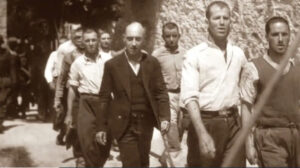On April 10, Turkey’s President Recep Tayyip Erdogan sent a letter to Boris Johnson, prime minister of the United Kingdom, informing him that Turkey “would like to welcome you in our country, which is your ancestral land.”
It is true that the Ottoman Empire, Turkey’s predecessor, is where Johnson’s paternal great-grandfather, Ali Kemal, was born. It is also where he was brutally murdered by Turkish nationalists in 1922 for wanting to bring to account the perpetrators of the 1915 Armenian genocide, and for criticizing the nationalist movement that would establish the Turkish Republic in 1923.
However, Turkey is denying the history behind the persecution and lynching of Kemal — just like it still denies the genocide itself.
Ali Kemal was a leading Ottoman journalist, editor, poet, novelist, and politician who served for some three months as the Minister of Education and then as the Minister of the Interior of the Ottoman Empire in 1919.
“Journalism is not a crime”: Human rights groups condemn judge’s Julian Assange extradition order
Because of his dissident writings and political speeches, Kemal had a hard life. He was a severe critic of the Committee of Union and Progress (CUP), also known as the Young Turks, which was the political party in power in the Ottoman Empire, and which made the decision to exterminate the Armenians in 1915. Kemal also publicly denounced the subsequent Turkish nationalist movement for its massacres against Christians.
As arrests and bans on his writings were an inevitable part of his life in the Ottoman Empire, Kemal lived in exile in Europe, Syria, and Egypt for much of his adult life. In 1909, he fled to Britain, where his first wife, a British woman named Winifred Brun, gave birth to their son, Osman Kemal Wilfred Johnson. Boris Johnson, born in 1964, is Wilfred’s grandson.
Read more: Algemeiner
Ask me anything
Explore related questions





